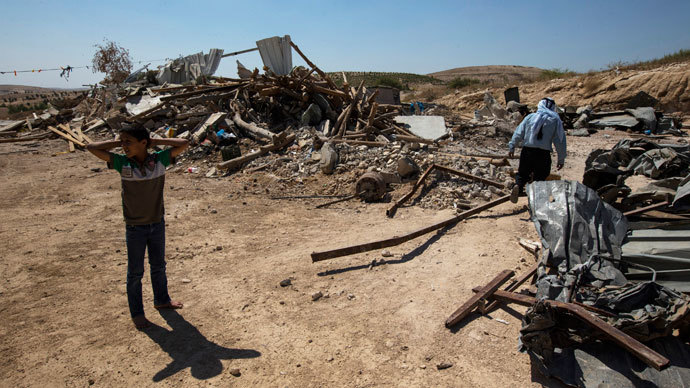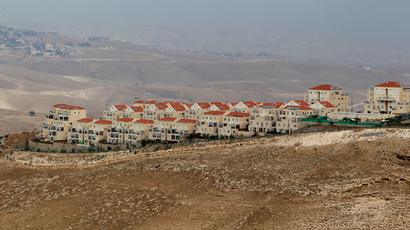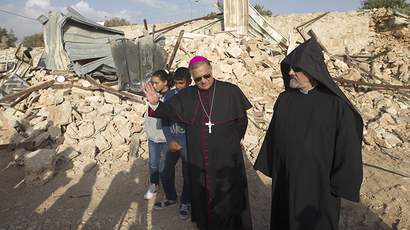Israel to demolish Bedouin village for national-religious Jewish town

The Israeli government voted on Sunday to raze a Bedouin-Palestinian village of 500 citizens to clear space for a Jewish town, prompting yet more protests against Israel’s unabated policy of settlement construction.
The government ministers moved to evict residents from the
Bedouin village Umm al-Hiran in accordance with the terms of the
so-called “Prawer plan," which calls for the resettlement
of large numbers of Bedouin villages.
The Bedouins have been offered alternative sites to which to
relocate, but they plan to hold protests against what they claim
is “discriminatory treatment by the state,” as quoted by
Haaretz, the Israeli daily.
Liberal Israeli publications have harshly denounced the treatment
of the Bedouins, who are being displaced by the very military
that some of them proudly served.
“These are Israeli citizens – citizens in a ‘democratic’
state, some of whom have even served the country militarily – who
are now having their homes destroyed,” David Harris-Gershon
wrote in his blog for the Tikkun Daily.
The Israeli government’s reasoning for demolishing Umm al-Hiran
is that the villagers never received ‘official’ zoning rights to
settle the land. However, critics say Israel refused to give a
stamp of approval to the village, despite ordering villagers to
settle the site in 1956.
Other commentators point to the ‘symbolic location’ of the
Bedouin village, situated as it is in the Negev Desert, described
by Israel’s first Prime Minister David Ben-Gurion as
“Zionism’s final frontier.”
In fact, Prime Minister Benjamin Netanyahu’s cabinet ministers
did not meet in Jerusalem at the Knesset, as is normal procedure,
to decide the fate of the Bedouins, but rather at Sde Boker, the
site of Ben-Gurion’s burial place.
“[Umm al-Hiran] residents are originally from the western part
of the Negev; they were expelled eastward by the IDF following
the 1948 war, and a kibbutz called Shoval was built on their
land,” Noam Sheizaf, an independent journalist, explained in
+972, a blog-based magazine.
After several years of moving from site to site, the army finally
told those members…to build their homes in Umm al-Hiran and Atir,
and so they did in 1956, Sheizaf added.
Meanwhile, funding for such settlement activity is partially
provided by the "North American Jewish community…through the
Jewish National Fund (JNF), an organization dedicated to
developing Israel for Jewish settlement,” Gershon revealed,
adding that “few North American Jews understand that their
donations are leading to the dispossession of
Bedouin-Palestinians and the razing of their homes.”
Plans to demolish the Bedouin village come as Israel continues
with a policy of settlement construction in former Palestinian
territories in the West Bank and elsewhere. Such an aggressive
policy threatens the prospects for peace in the region, as well
as the hopes for a viable Palestinian state.
“The amount of settlements is huge and probably irreversible,
and the signal that the Israeli government is sending to the
Palestinians, to the rest of the Middle East, to the world, by
continuing even aggressively to settle – it is a very negative
signal, because if now the talks will not conclude in an
agreement, it won’t be called a ‘peace agreement', when we will
meet next time to talk with the Palestinians,” Alon Liel,
former director general of Israel's Foreign Ministry, told RT.
“In three or five, who knows, maybe 10 years – the volume of
the settlements will be bigger, and the chance for a Palestinian
state smaller,” Liel added.
The Israeli cabinet’s move to displace the Bedouin community in
favor of a “national-religious Jewish community” will be
the subject of a Supreme Court case, scheduled to be heard next
week.
In 2009, the National Council for Planning and Building approved
plans to build Hiran on the site of the Bedouin village.
Haaretz on Sunday quoted sources at Adallah, the Legal Center for
Arab Minority Rights in Israel, saying that the construction of
Jewish settlements in the Negev at the same time that the
government is moving forward with the Prawer plan “reflects a
racist approach toward the Bedouin residents of the Negev.”
Instead of displacing the indigenous population of Bedouin, the
sources said, the government should engage the community in a
dialogue over an alternative to the Prawer relocation plan.
Meanwhile, a group responsible for organizing a protest at the
Supreme Court, the Negev Coexistence Forum for Civil Equality,
called the proposed demolition plan for Umm al-Hiran a policy
that promotes social inequality between Jews and Arabs, the
Israeli daily reported.














